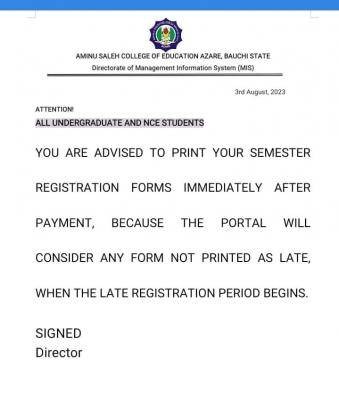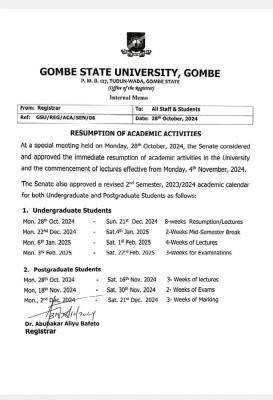
The year 1999 will remain a landmark year in the history of Nigeria. Most of us remember it as the year the military returned government for the second time after almost 16 years since the coup of 1983 which brought an end to the Second Republic. The Third Republic was aborted in 1993 when the Presidential election was annulled after the June 12, 1993 elections.
However, from the standpoint of university education, 1999 was even more unique for education more than politics. It was in 1999 that the first group of people with foresight and courage took up the challenge of establishing private universities and when the first set of licences were issued for that purpose.
Individually and collectively, they were responding to a growing national need for more university education. The kids of the Free Education era of the 1950s were becoming parents of kids whose population far outstripped the ability of governments at federal and state levels to provide varsity accommodation.
As the number of young people turned down by public varsities grew; and as the same public varsities became increasing stretched beyond limit, it was clear that governments alone could no longer cope with the challenge.
At any rate, Nigeria was operating with an obsolete and inappropriate model for the development of varsity education. To some extent, we still are not getting it right. We have not yet come to grips with many of the questions which we must answer if private education is to avoid the fate of the brewery, the textile and the battery manufacturers in Nigeria.
When 30 became three or four – breweries
After years of sales and marketing experience in the pharmaceutical industry, including years as the National Sales Director of BOOTS NIGERIA LIMITED, then the darling of the Nigerian Stock Exchange for its hefty dividends and script issues; followed by two years as the Country Sales Manager for SmithKline & French, now part of GlaxoSmithKline, GSK, I ended up, inexplicably as the Marketing Manager for North Brewery Limited, Kano. I could easily have been the General Sales Manager for Dr Pepper Bottling Company at Eket, in now Akwa Ibom State.
Let me quickly answer the question: why did beverage manufacturers reach out to the drug industry to select their top marketing officer in 1980? The answer was simple. Until the early 1980s, the brewery and beverage industry was characterized by scarcity. Sales and marketing officers were actually allocating scarce products instead of bottling them.
But, a commercial delegation appointed by the federal government, in the middle 1970s and led by late Chief Henry Fajemirokun had gone abroad in search of foreign investors to partner with Nigerians to establish industries in those areas where Nigeria was experiencing scarcity. Two sectors, textiles and breweries, among over 15, should serve as proxy for the rest.
Very soon, on account of our burgeoning population and rapid GDP growth, then close to 10%, it was decided that the best options were in those sectors which are best served by a big market – which was getting bigger everyday. Textiles and beer were the top two. I was not involved in textiles; but, we all know what happened to that industry. The brewery was “my home”. From late 1980 till 1989, I was involved with four of them.
Before 1970, there were only three breweries in Nigeria – Nigerian Breweries Limited, Guinness and West African breweries. By 1983, over 20 breweries had opened shop. Whereas the pharmaceutical industry had always been very competitive, the brewery sector, until 1983, characterized by friendly competition.
For instance, every brand of blood tonic or multivitamin or worm expeller, or analgesic had nothing less than 30 competing brands. It was cut-throat competition and it still is from what I can see in the drug stores. I was, if you don’t mind my saying it, one of the best. That was why I was engaged by a brewery – just when the competition was about to change from gentlemanly to brutal.
The owners of private universities have not yet understood that they constitute a business sector – despite all the efforts made not to admit that they are running businesses. In fact, if they are not careful, too much coyness on their part will doom their ventures. Like most new business sectors, they have special needs which are almost generic and which require the support and assistance of governments – virtually all the time. For that they need a Secretariat working 24/7 to protect their interests and to advance them.
THE FIRST THREE
“He was a bold man who first swallowed an oyster”, Jonathan Swift, 1667-1745.
By any measure known to men in public life, those who first plunged into the, then murky, waters of private university education in Nigeria deserve our everlasting gratitude for their courage. At a time when university education was virtually free and, in some states, students were being paid to go to universities, they saw prospects for better quality education for which stakeholders would willingly pay.
It was a gamble; it is still a gamble; made more so by the fact that more private universities are on the way – at a time when the Nigerian economy is again threatened with a downturn; just as in the 1980s. The cloud in the horizon is real. And whereas few people mourned the collapse of breweries, all Nigerians will experience a sense of tragedy if any university should fail.
The first three private universities, in alphabetical order, in Nigeria, starting in 1999, were Babcock University at Ilishan, in Ogun State; Igbinedion University, at Okada, Delta State and Madonna University, Okija, Anambra State. Time flies.
Who would have believed that next year each of these varsities would have been 25 years old?



